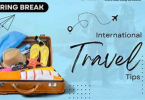Traveling is one of life’s most enriching experiences. It opens your mind, broadens your perspective, and fills you with memories that last a lifetime. But if you’re new to it, travel can also seem overwhelming — from planning and packing to managing expenses and staying safe in unfamiliar places.
Don’t worry. This detailed guide on travel tips for beginners will walk you through everything you need to know before you set off on your first journey. We’ll talk about how to plan smartly, pack efficiently, and travel with confidence — plus the benefits and challenges that come with it.
1. Start Small and Build Confidence

For your first few trips, start small. You don’t need to travel across the world to have a meaningful experience. Begin with short weekend trips or local destinations within your country. This helps you get used to being on the move — handling tickets, checking into accommodations, and exploring new environments — without the added stress of language barriers or culture shock.
Why it helps: Starting small lets you learn from small mistakes. You’ll understand your travel style, what you truly need to pack, and how you prefer to plan.
Example: If you live in the U.S., try visiting a nearby state before going abroad. If you’re in Europe, explore a neighboring country by train.
2. Learn to Pack Smart and Light
Overpacking is one of the most common beginner mistakes. It’s tempting to take “just in case” items, but they usually end up unused and heavy to carry.
Here’s a simple method:
- Lay out everything you think you’ll need.
- Remove about one-third of it.
- Focus on versatile, lightweight, and comfortable clothing.
Packing essentials for beginners:
- Basic first aid kit and necessary medications.
- Toiletries in travel-sized containers.
- Power bank and universal adapter.
- A small lock for your luggage.
- Important documents and copies (passport, ID, insurance).
Pro tip: Rolling your clothes instead of folding them saves space and keeps them less wrinkled.
3. Set a Realistic Budget
One of the best travel tips for beginners is to budget carefully. Traveling doesn’t have to be expensive, but costs can add up quickly if you’re not prepared.
How to plan your budget:
- Research average accommodation and food costs in your destination.
- Allocate money for transportation, attractions, and emergencies.
- Use budgeting apps like TravelSpend or Trail Wallet to track expenses.
Always keep an emergency fund — around 10–15% of your total budget — for unexpected situations like medical needs or last-minute changes.
4. Choose the Right Accommodation
Where you stay matters. A good accommodation can make your trip relaxing, while a poor one can turn it stressful.
Things to consider:
- Location: Stay close to attractions or public transport.
- Reviews: Always check recent reviews for cleanliness and safety.
- Facilities: Free Wi-Fi, breakfast, laundry, and security are a plus.
For beginners, it’s better to spend a little more for comfort and safety rather than saving a few dollars on a risky option. Websites like Booking.com, Agoda, or Airbnb make comparing options easy.
5. Use Technology to Make Traveling Easier
Traveling has become much simpler thanks to technology. There are countless apps that can make your journey smoother.
Essential travel apps for beginners:
- Google Maps: Helps with navigation and finding nearby restaurants or attractions.
- Google Translate: Useful for basic communication in foreign countries.
- TripIt: Organizes your flight, hotel, and itinerary in one place.
- XE Currency: Keeps you updated with currency exchange rates.
- Rome2Rio: Shows travel routes between cities by plane, train, bus, or car.
Having these tools handy will save time, reduce stress, and make you feel more in control.
6. Keep Your Documents Safe and Organized
Your passport, ID, and travel documents are your most valuable items. Losing them can cause serious problems, especially abroad.
Travel safety tips for beginners:
- Keep your passport in a secure, easily accessible place (like a neck pouch or money belt).
- Store digital copies on your phone or cloud storage.
- Email yourself copies in case of emergency.
- Avoid carrying all your money and cards in one place.
This small step can save you a lot of trouble if something goes wrong.
7. Try Local Food — but Be Cautious
Food is a huge part of experiencing another culture, and it’s one of the best parts of traveling. However, beginners should be cautious when trying new foods — especially street food.
Tips for enjoying local food safely:
- Eat where locals eat — busy spots often indicate good hygiene.
- Watch how food is prepared and handled.
- Drink bottled or filtered water if the tap water isn’t safe.
- Carry medicine for upset stomachs or allergies.
Being careful doesn’t mean missing out; it means enjoying your trip without any health setbacks.
8. Connect with Locals and Other Travelers
Meeting people is one of the most rewarding parts of traveling. Locals can give you authentic insights about the best places to eat, visit, and experience.
If you’re shy or traveling solo, start small. Chat with someone at a café or join a local tour group. Hostels are also great for meeting fellow travelers who share similar interests.
You’ll often find that a friendly conversation can lead to new friendships, experiences, or even future travel companions.
9. Plan Ahead — but Leave Room for Flexibility
Having a general plan for your trip is great, but don’t schedule every minute. Overplanning can make travel feel like work instead of fun.
A balanced plan includes:
- A list of must-see attractions.
- Some free time for spontaneous activities.
- Backup plans in case of bad weather or closures.
Being flexible allows you to take advantage of unexpected opportunities — maybe a local festival, a scenic route, or a hidden café you stumble upon.
10. Stay Calm and Patient
Traveling will test your patience sometimes — flights get delayed, hotels get overbooked, or transportation doesn’t run on time. These situations are part of the experience.
The best thing you can do is stay calm and positive. Instead of stressing out, view each hiccup as a learning moment. Experienced travelers know that flexibility and patience are key to enjoying any journey.
You may also like to read these posts:
Mountain Hiking Adventure Trips: A Complete Guide to Your Next Great Outdoor Adventure
Adventure Travel for Couples: Strengthen Your Bond Through Shared Adventures
Extreme Adventure Trips Guide: Dare to Live Beyond the Ordinary
Outdoor Adventure Travel Plans: A Complete Guide to Exploring the Great Outdoors
Benefits of Traveling for Beginners

- Personal Growth: Traveling pushes you out of your comfort zone, helping you become more independent, confident, and adaptable.
- Cultural Awareness: You learn about new customs, traditions, and ways of life that expand your worldview.
- New Experiences: Every trip offers something unique — from food and architecture to nature and human connections.
- Stress Relief: Stepping away from routine life can help you recharge mentally and emotionally.
- Improved Communication Skills: You learn to interact with people from different backgrounds, even if you don’t share the same language.
Drawbacks and Challenges for Beginners
- Initial Anxiety: First-time travelers often feel nervous about the unknown — airports, languages, or new cultures.
- Budget Constraints: Traveling can be costly if not planned carefully, leading to financial stress.
- Jet Lag and Fatigue: Long journeys can affect your energy levels and sleep patterns.
- Cultural Misunderstandings: Without proper research, it’s easy to make social mistakes in different countries.
- Unexpected Situations: Delays, lost luggage, or getting lost are common — but manageable with preparation.
The good news is that most of these challenges lessen with experience. Every trip teaches you how to handle them better.
Final Thoughts
Traveling for the first time is an exciting milestone. With the right preparation, mindset, and awareness, you can avoid common mistakes and focus on enjoying your adventure.
Remember: every traveler starts as a beginner. The more you travel, the more confident and capable you become. Start small, plan wisely, and embrace every moment — even the imperfect ones.
These travel tips for beginners are not just about logistics; they’re about learning how to enjoy the journey, connect with people, and grow as a person. Once you take that first trip, you’ll realize that the world is much more welcoming and wonderful than you ever imagined.
FAQs
1. What is the best way to start traveling as a beginner?
The best way to start is to begin small. Plan a short trip within your country or to a nearby destination. This allows you to learn basic travel skills — such as packing, budgeting, and navigating — without the pressure of being far from home. Once you’re comfortable, you can move on to international trips.
2. How can I overcome travel anxiety before my first trip?
Travel anxiety is completely normal for beginners. The best way to handle it is through preparation. Research your destination, make checklists, and plan your itinerary so you know what to expect. Also, keep in mind that small hiccups happen to every traveler — it’s part of the journey. Deep breathing, keeping a flexible mindset, and focusing on the excitement rather than fear can help too.
3. What are the most important things to pack for a beginner traveler?
You don’t need to pack too much. Focus on essentials such as:
Passport, ID, and copies of important documents
Basic first aid and prescribed medications
A power bank and universal travel adapter
Comfortable clothes and shoes
Toiletries in travel-sized bottles
Reusable water bottle and snacks
Remember, packing light makes traveling easier and more enjoyable.
4. How do I plan my travel budget?
Start by researching the cost of flights, accommodation, food, transportation, and attractions at your destination. Set a daily spending limit and always include an emergency fund (around 10–15% of your total budget). Use mobile apps like Trail Wallet, TravelSpend, or Mint to track your spending during the trip.
5. Is it safe to travel alone as a beginner?
Yes, solo travel can be safe and rewarding — as long as you take precautions.
Share your travel plans with family or friends.
Stay in reputable accommodations with good reviews.
Avoid isolated areas at night.
Keep emergency contacts handy.
Solo travel helps you become independent and confident, but always prioritize safety.




